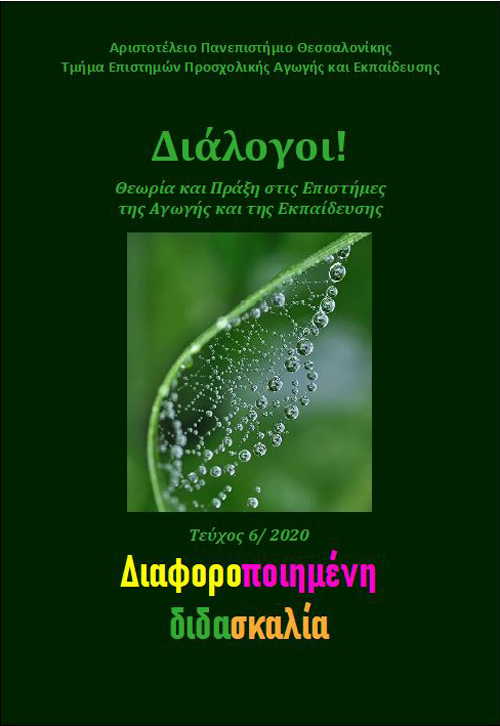Διαφοροποίηση της διδασκαλίας και της μάθησης: Δυσκολίες και παρανοήσεις

Περίληψη
Το άρθρο επισημαίνει και συζητά τις λανθασμένες αντιλήψεις, γνωστές ως παρανοήσεις (misconceptions) (National Research Council, 1997), οι οποίες αναφέρονται είτε απευθείας στην έννοια και τις διαδικασίες της Διαφοροποίησης της Διδασκαλίας και Μάθησης είτε στις θεωρίες περί μάθησης και του ρόλου του εκπαιδευτικού και οι οποίες επηρεάζουν τη θεωρία και εφαρμογή της διαφοροποίησης, σε τάξεις μικτής ετοιμότητας. Βασικός σκοπός είναι να απαντηθεί το επαναλαμβανόμενο ερώτημα των εκπαιδευτικών για το πώς είναι δυνατό να διδάσκει κανείς και να ικανοποιεί την ίδια ώρα τις διαφορετικές ανάγκες διαφορετικών μαθητών. Η ίδια η ερώτηση αναδεικνύει πολλές λανθασμένες αντιλήψεις. Διευκρινίζεται η έννοια και προτείνονται πρακτικές εφαρμογής στην τάξη καθώς και ενδοϋπηρεσιακής επιμόρφωσης των εκπαιδευτικών σε σχολική βάση, μέσα από διαδικασίες Έρευνας Δράσης (π.χ. Koutselini, 2008b, 2010).
Λεπτομέρειες άρθρου
- Πώς να δημιουργήσετε Αναφορές
-
Ιωαννίδου-Κουτσελίνη Μ. (2020). Διαφοροποίηση της διδασκαλίας και της μάθησης: Δυσκολίες και παρανοήσεις. Διάλογοι! Θεωρία και πράξη στις επιστήμες αγωγής και εκπαίδευσης, 6, 12–29. https://doi.org/10.12681/dial.25544
- Τεύχος
- Τόμ. 6 (2020)
- Ενότητα
- Ειδικό Θέμα

Αυτή η εργασία είναι αδειοδοτημένη υπό το CC Αναφορά Δημιουργού – Μη Εμπορική Χρήση – Παρόμοια Διανομή 4.0.
Οι συγγραφείς των άρθρων που δημοσιεύονται στο Διάλογοι! Θεωρία και Πράξη στις Επιστήμες Αγωγής και Εκπαίδευσης διατηρούν τα δικαιώματα πνευματικής ιδιοκτησίας επί των άρθρων τους, δίνοντας στο περιοδικό το δικαίωμα της πρώτης δημοσίευσης. Άρθρα που δημοσιεύονται στο Διάλογοι! Θεωρία και Πράξη στις Επιστήμες της Αγωγής και Εκπαίδευσης διατίθενται με άδεια Creative Commons 4.0 και σύμφωνα με την άδεια μπορούν να χρησιμοποιούνται ελεύθερα, με αναφορά στον/στη συγγραφέα και στην πρώτη δημοσίευση για μη κερδοσκοπικούς σκοπούς και με δικαίωμα τροποποίησης μόνον με παρόμοια διανομή (αν αναμείξετε, τροποποιήσετε, ή δημιουργήσετε πάνω στο υλικό, πρέπει να διανείμετε τις δικές σας συνεισφορές υπό την ίδια άδεια όπως και το πρωτότυπο).
To Τμήμα Επιστημών Προσχολικής Αγωγής και Εκπαίδευσης του Αριστοτέλειου Πανεπιστημίου Θεσσαλονίκης και το Εθνικό Κέντρο Τεκμηρίωσης διατηρούν το δικαίωμα να δημοσιεύουν, να αναπαραγάγουν, να παρουσιάζουν στο κοινό, να διανέμουν και να χρησιμοποιούν άρθρα που δημοσιεύονται στο Διάλογοι! Θεωρία και Πράξη στις Επιστήμες Αγωγής και Εκπαίδευσης σε οποιοδήποτε μέσο και μορφή είτε μεμονωμένα είτε ως μέρη συλλογικών έργων, για όλο το χρόνο διάρκειας προστασίας της πνευματικής ιδιοκτησίας και για όλες τις χώρες του κόσμου.
Αυτό περιλαμβάνει ενδεικτικά, και όχι αποκλειστικά, το δικαίωμα δημοσίευσης των άρθρων σε τεύχη του περιοδικού Διάλογοι! Θεωρία και Πράξη στις Επιστήμες Αγωγής και Εκπαίδευσης, αναπαραγωγής και διανομής μεμονωμένων αντιγράφων των άρθρων, αναπαραγωγής ολόκληρων των άρθρων σε άλλη έκδοση του Τμήματος Επιστημών Προσχολικής Αγωγής και Εκπαίδευσης του Αριστοτέλειου Πανεπιστημίου Θεσσαλονίκης και του Εθνικού Κέντρου Τεκμηρίωσης και αναπαραγωγής και διανομής των άρθρων ή περίληψης αυτών με χρήση πληροφορικού συστήματος αποθετηρίου.


